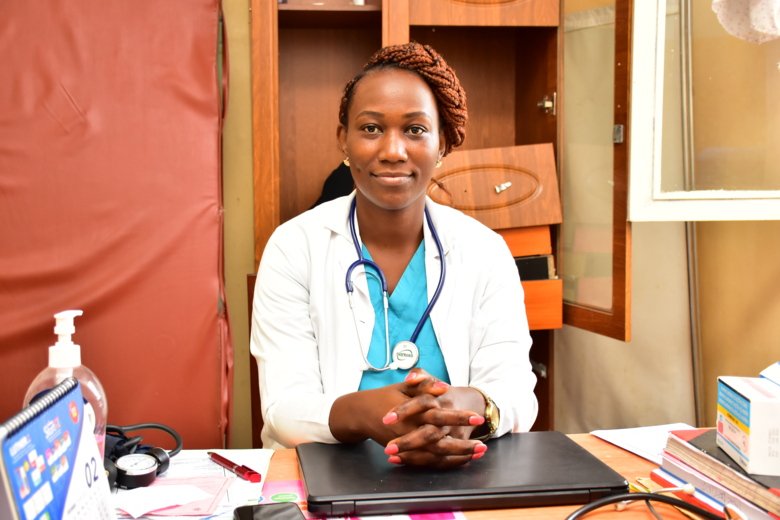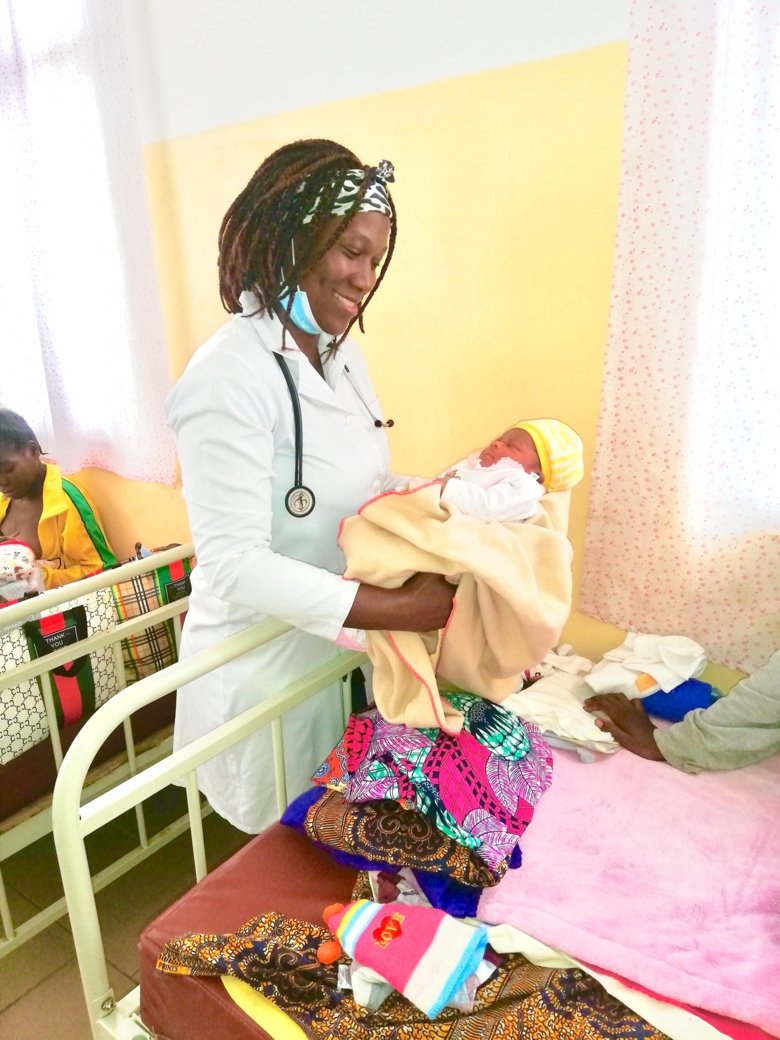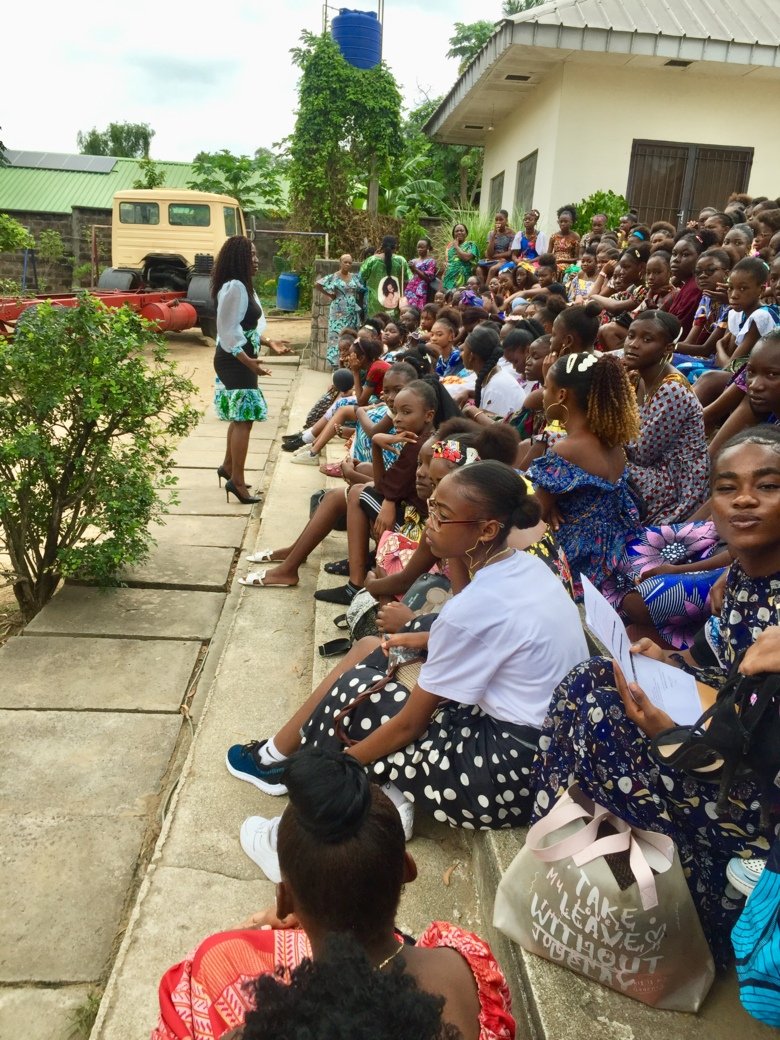Using a KI programme to improve maternity care in Congo-Kinshasa

When Rebecca Furaha was looking for programmes that could help her improve maternity care in Congo-Kinshasa, she found what she was looking for at KI. Now she runs collaborative projects to increase knowledge about sexual and reproductive health among the country’s young people.
Rebecca Furaha is a general practitioner specialising in maternity care and works at a small hospital on the outskirts of Kinshasa, the capital of Congo-Kinshasa. For the past two years, she has supervised the hospital’s maternity ward. “We work across the entire area of sexual and reproductive health, with everything from giving advice on contraception to pregnancy and childbirth,” says Furaha.
For some time, she has been frustrated by the difficulty of improving the standard of maternity care in the country. Congo-Kinshasa suffers from high rates of maternal and child mortality and knowledge of sexual and reproductive health is limited. She found KI’s “Managing Innovation for Sustainable Health” programme while searching on Twitter.

Programme suited to the unpredictable nature of life of Congo-Kinshasa
“The programme is suited to the unpredictable nature of everyday life we experience in healthcare in low-income countries such as Congo-Kinshasa. Our population lives in extremely difficult conditions. The programme gives me knowledge that I can use directly on a daily basis,” says Furaha. She has especially appreciated the part of the programme that deals with strengthening multi-sector collaboration. The hospital’s maternity ward receives many young people who are suffering the consequences of abortions performed outside hospitals. Abortion is illegal in Congo-Kinshasa except in certain exceptional circumstances.
“We take care of girls as young as 14 with acute complications after carrying out abortions in very unsafe and dangerous conditions.” In many cases, knowledge about contraception is non-existent among the country’s young people. This ignorance results in unwanted pregnancies and illegal abortions that cause suffering and death. “If we’re to succeed in the fight against unwanted pregnancies, we all need to help each other. During the programme, I’ve learned the importance of working across different sectors to make an impact. We need to collaborate more with schools, religious leaders and communities to reach young people.”
Innovation by changing working methods and approaches
During the programme, Furaha started a project in which healthcare staff visit schools to share information and improve knowledge about sexual and reproductive health. “We can’t sit back and wait for these young people to come to us. By then, it’s too late, and they need emergency care. Rather, we need to find more ways to collaborate with schools and other public organizations to reach them in time,” Furaha says.
When we do the interview, she is about halfway through the programme and so far all teaching has been conducted remotely. The programme has generated a high degree of commitment among participants and now a first physical meeting is planned. “I’m really looking forward to meeting everyone else and deepening the discussions we have had online. We have many shared experiences to learn more from.” She also makes sure that the knowledge from the programme is disseminated to her employees and managers. “My goal is that ours and other clinics can collaborate more with other organizations.”

She says that the interpretation of the concept of innovation during the programme has been a revelation. It is easy to think that all innovation must involve technological solutions in some form. But it could just as well be about changing working methods and approaches. “We need to improve how we offer healthcare so that it becomes more efficient and reaches more citizens. To do this, knowledge of how change can happen is needed, as are role models who can show the way,” Furaha says. Nursing training in Congo-Kinshasa currently lacks leadership courses and courses in innovation, she adds. “Skills in leadership and innovation will be critical if we are to achieve the goals of the UN’s Agenda 2030. That has also become clear during the programme,” says Furaha.
Aspiring to improve the entire country’s healthcare system
Becoming a doctor is something Furaha dreamed of ever since she was little. At one stage, her family was forced to live in a refugee camp, where she met healthcare staff who became her role models. After medical training, she worked for a non-profit organization that supports children and young people from Kasai province, which had been wracked by the country’s internal conflicts. The goal was to provide mental health care to traumatized children and adolescents to help them reintegrate socially and pursue their education. “Now I want to gain further knowledge to be able to contribute to improving the entire country’s healthcare system”.
She specialises in the field of sexual and reproductive health, and has applied for several international master’s programmes, including in England. In the future, she sees herself as a leader in healthcare in Congo-Kinshasa. “There are many aspects of healthcare that need to change, even though we have made some progress. Most importantly, I see the need to reach out to people with the right knowledge in time, and spread information about contraception, for example, to those who really need it,” says Furaha.
Rebecca Furaha
Age: 31
Family: Husband and three children.
Lives: Kinshasa, Democratic Republic of Congo (also referred to as Congo-Kinshasa).
Hobbies: Likes to bake and loves making birthday cakes for friends and family.
About Managing innovation for sustainable health (MISH)
Managing Innovation for Sustainable Health is funded by the Swedish Institute through the SI Public Sector Innovation Programme, which targets universities and colleges. The training programme is carried out in cooperation with key public sector actors in low- and middle- income countries with the aim of promoting innovation and sustainability in partnering countries.
The training is based on the 2030 Agenda and the aim of the programme is for participants to develop their capacity to successfully collaborate across sectors and use an innovative approach to strengthening both preventive and curative health care in the DRC, Uganda and Somalia. The programme is developed and organised by Karolinska Institutet, Makerere University, Benadir University, University of Kinshasa School of Public Health and the innovation company Tinkr within the Centre of Excellence for Sustainable Health.
